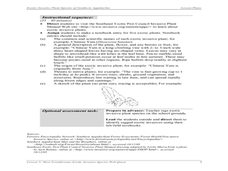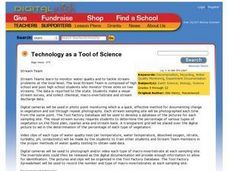Curated OER
Eat Your Plants
Students explore fruits and vegetables. In this fruits and vegetables lesson, students work in small groups investigating plant parts. Students discover that fruits and vegetables originate from different parts of plants.
Curated OER
Everybody Needs a Rock
Second graders examine science non-fiction books in the 500 section of the media center. They listen to Byrd Baylor's, Everybody Needs a Rock, and write a sentence that tells why everyone does need a rock. They illustrate the sentence.
Curated OER
Water Quality Monitoring
Students comprehend the four parameters of water quality. They perform tests for salinity, dissolved oxygen, pH and clarity or turbidity. Students comprehend why scientists and environmental managers monitor water uality and aquatic...
Curated OER
The Portable Niche
Third graders, in groups, research animals, plants, and conditions found in ecosystems.
Curated OER
Investigating Earth's Materials
First graders compare and contrast water from different sources. After collecting water from various sources, 1st graders create a list of observable properties of the water. Students then pour the water into a filter and observe the...
Curated OER
Underground Pollution
Fourth graders construct their own aquifer. They discover how water travels underwater and identifies sources of underground pollution. They record their observations and discuss the results.
Curated OER
Porosity
Students investigate the concept of an aquifer and use a 2 liter bottle and other materials to conduct a simple lab experiment or demonstration. They calculate the volume of water that can be stored in the aquifer. The lab is used to...
Curated OER
Investigate Factors Affecting Nitrates in Groundwater
Students participate in an experiment in which they investigate the factors affecting the levels of nitrates in groundwater. Using examples, they explain the nitrogen cycle and identify the sources of chemical nitrogen fertilizers. ...
Curated OER
Earth Surface Socratic Questions
Students explore the ways Earth's surface is shaped by hydrologic, climate and tectonic forces by participating in a whole class discussion. They respond to prompts that lead them to conclusions about the relationships between landforms...
Curated OER
Ecology of the Dump
Young scholars recreate landfills in petri dishes, observe relative biodegradability in a year-long project, and isolate a cellulose degrading bacteria while discovering the need for recycling and the serious problem waste management has...
Curated OER
Our Schoolsyard is Full of Biology
Students study the habitats found in their schoolyard. They apply firsthand, what they have learned in the classroom to something familiar to them. Students look at biotic, abiotic habitats. Small groups will present their findings to...
Curated OER
Most Troublesome Exotic Invasive Plant Species Web Quest
Students participate in a Web Quest activity in which they identify common exotic invasive plant species of the Southern Appalachian Region. After identifying the top 10 exotic invasive species, they choose one to research in depth.
Curated OER
Technology as a Tool of Science
Students monitor streams, take stream surveys, collect chemical and macro-invertebrate and stream discharge data. Using a digital camera, students observe the percentage of various types of vegetation on the flood plan, riparian area and...
Curated OER
Making a Mini-Landfill
Students create a mini-version of a landfill. They examine the materials they use everyday and determine if they decompose or not. They identify the materials as renewable or nonrenewable as well.
Curated OER
A Special Relationship: Connecticut and Its Settlers
Students study both geological and geographical features of Connecticut and the New Haven area. They focus on map works and rock formation.
Curated OER
China: Dim Sum: Sand Painting: Mandalas Lesson
Students discover the art form of mandalas and create their own sand paintings. In the process, students explore the history of this art form in Tibetan culture.
Curated OER
ASWAN HIGH DAM
Students use modeling compound, Lego blocks, water, paper and tape to construct and label the Aswan High Dam.
Curated OER
Have Fun With Technical Report Writing
High schoolers use Clarisworks Word Processing and Spreadsheet, Quick-Take Camera and Software, and produce a publishable technical paper.
Curated OER
Cleansing, Sparkling Koos
Students explore the importance of water conservation and investigate how plants clean water.
Curated OER
Mud Fossils
Students create their own fossils in an activity using plaster of paris and a variety of objects which can be fossils, e.g. chicken bones, twigs, shells, etc. After making their fossils, they allow them to dry and discuss time and its...
Curated OER
Bioremediation
Students design and conduct investigations that illustrate the effect bioremediation has on organic matter and determine environmental applications. They, in groups, present their findings to the class.
Curated OER
Philadelphia's Important Contribution to the Lewis and Clark Expedition
Students analyze a primary source document (Jefferson's secret letter to Congress) and identify its objectives through the aid of focus questions. They complete a graphic organizer and write an article summarizing Philadelphia's...
Curated OER
Evaluate Ecosystems
Students collect data from a field study. They write an environmental impact statement and design a plan to improve the ecosystem they have been observing. Finally, they give a presentation on the data and information they have collected.
Curated OER
Don't Trust Your Eyes
Students brainstorm a list of possible actions that they could do to protect the water resources from pollution. They create hypotheses and conclusions by completing experiments and observing different pollutants.

























